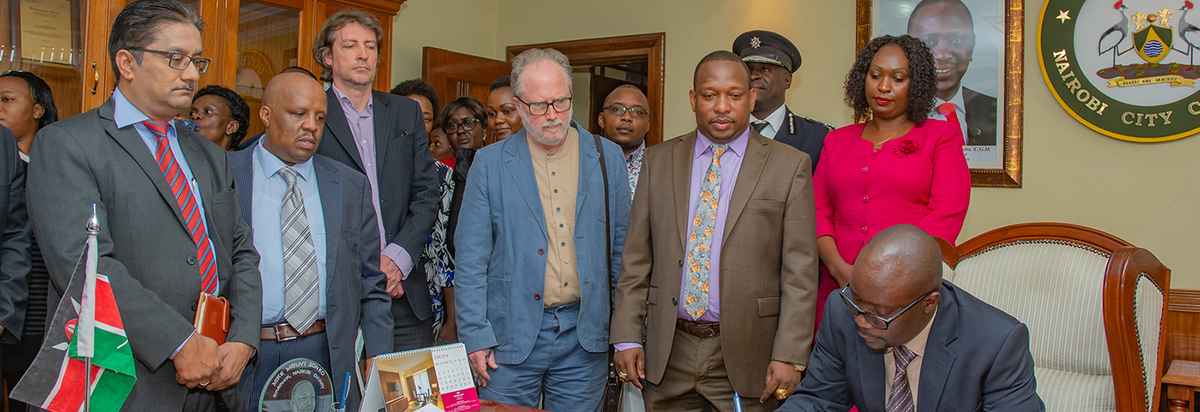
In Nairobi, Tomorrow’s Cities is working in partnership with government and communities to build disaster risk out of urban development. Research will be of direct benefit to one million informal settlement dwellers in Mukuru and Kibera. Internationally the lives and livelihoods of two billion people who live in cities of low-to-middle income countries are threatened by floods, earthquakes, landslides, volcanoes and fires. This number is expected to reach four billion by 2050.
Such impactful research is only possible because of the considerable commitment made by Nairobi City County and by community based organisations such as the Kounkuey Design Initiative, brought together by the research of the Tomorrow’s Cities Hub.
Nairobi City County Government has a Disaster and Emergency Management Act 2015, but implementation is difficult because of the need for technical translation into the mandates and capacities of individual departments from fire safety to health and urban planning. The Tomorrow’s Cities Hub is working closely with the City to resolve this. As Brian Kisali, Deputy Director, Disaster Management and Coordination, Nairobi City County Government says, the Act and its associated policy “ does not link to all the sectors…the Hub will support them to complete and contribute to the review of the Act and the development of integrated disaster management policy and planning”.
This achievement is only possible because of GCRF ODA research funding which emphasises research through partnerships so that new knowledge is useful and used. The Tomorrow’s Cities Hub was co-designed with the Nairobi City County Government (NCCG) from the outset, to gain an intimate knowledge of the varied responsibilities and workings of the NCCG. Building this joint research has taken considerable commitment from all sides. “At the end of the day Disaster Reduction risk is a multi-sectoral issue that requires a multi-sectoral approach. So that every sector plays their part” says Mr Joel Muli, Sub-County Administrator, NCCG.
Any cut in agreed research budgets will undermine this hard won, trusted relationship between the NCCG and UK research partners and put lives at risk by slowing down implementation of the Act. Cuts to ODA research will be most harmful for the most marginal in society including low income households, women, children and those already affected by events like COVID-19.
Damage to the lives and wellbeing of the urban poor that cuts will bring is emphasised by a community group working with 200,000 of Nairobi’s most marginal residents in the Kibera settlement. Kounkuey Design Initiative (KDI) Design Director, Jack Campbell-Clause argues that: "in the neighbourhoods we work: Kibera, Mukuru, Mathare, and other historically disenfranchised areas, new legislative and planning vehicles for participatory upgrading are emerging, but there is a massive gap in the planning tools available to municipalities, planners, and engineers, to integrate risk information and community perspectives into an integrated and resilient infrastructure design. Tomorrow's Cities holds that promise for the neighbourhoods where the majority of Naiorobian's live, and could chart a pathway for many more cities in the region to create a risk-informed decision making space".
Tomorrow’s Cities has successfully built relationships and opened processes for skill sharing with direct benefit to some of the poorest and most vulnerable urban residents in the World. KDI Kenya's Research Director Vera Bukachi adds: "In its first phase the project has been investing significantly in research capacity on natural and social sciences across multiple hazards. Building local research capacity and accessing world-class research approaches through collaboration with our partners in the UK builds a strong foundation".
ODA cuts to already programmed research will directly harm the life chances of the most vulnerable today and could potentially erode partnership gains with the UK already achieved over the last few years.